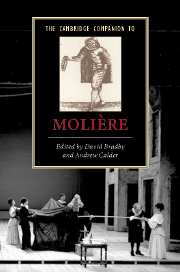Book contents
- Frontmatter
- 1 The career strategy of an actor turned playwright: 'de l’audace, encore de l’audace, toujours de l’audace’
- 2 The material conditions of Molière’s stage
- 3 The master and the mirror: Scaramouche and Molière
- 4 Molière as satirist
- 5 How (and why) not to take Molière too seriously
- 6 L’Avare or Harpagon’s masterclass in comedy
- 7 Laughter and irony in Le Misanthrope
- 8 Comédies-ballets
- 9 Le Bourgeois gentilhomme: Molière and music
- 10 Medicine and entertainment in Le Malade imaginaire
- 11 Molière and the teaching of Frenchness: Les Femmes savantes as a case study
- 12 L'École des femmes: matrimony and the laws of chance
- 13 Molière nationalised: Tartuffe on the British stage from the Restoration to the present day
- 14 Landmark twentieth-century productions of Molière: a transatlantic perspective on Molière: mise en scène and its historiography
- 15 Dom Juan the Directors’ Play
- 16 ‘Reculer pour mieux sauter’: modern experimental theatre’s debt to Molière
- Select bibliography
- Index
- Series List
14 - Landmark twentieth-century productions of Molière: a transatlantic perspective on Molière: mise en scène and its historiography
Published online by Cambridge University Press: 28 March 2007
- Frontmatter
- 1 The career strategy of an actor turned playwright: 'de l’audace, encore de l’audace, toujours de l’audace’
- 2 The material conditions of Molière’s stage
- 3 The master and the mirror: Scaramouche and Molière
- 4 Molière as satirist
- 5 How (and why) not to take Molière too seriously
- 6 L’Avare or Harpagon’s masterclass in comedy
- 7 Laughter and irony in Le Misanthrope
- 8 Comédies-ballets
- 9 Le Bourgeois gentilhomme: Molière and music
- 10 Medicine and entertainment in Le Malade imaginaire
- 11 Molière and the teaching of Frenchness: Les Femmes savantes as a case study
- 12 L'École des femmes: matrimony and the laws of chance
- 13 Molière nationalised: Tartuffe on the British stage from the Restoration to the present day
- 14 Landmark twentieth-century productions of Molière: a transatlantic perspective on Molière: mise en scène and its historiography
- 15 Dom Juan the Directors’ Play
- 16 ‘Reculer pour mieux sauter’: modern experimental theatre’s debt to Molière
- Select bibliography
- Index
- Series List
Summary
If over the course of the last half-century or so the majority of Molière scholars have become increasingly convinced of the value of studying the plays in the context of their performance in the theatre, the task of analysing Molière in performance has itself grown considerably more complex during the same period, particularly with the proliferation of Molière productions following the Second World War. This proliferation was especially evident in France, where the decentralisation of state-supported theatre led to the creation of what has become, in effect if not always in name, a network of national theatres - a network in the sense that many productions tour from one state-supported theatre to another, and also in the sense that companies from time to time pool resources to make certain projects possible. Over roughly the same period, a decentralisation of theatre occurred in the United States, although not as a result of a consciously promoted government policy. The institutions that were created in the American process of decentralisation came to be called regional or resident theatres, although four decades or so after the majority of those decentralised institutions came into being, given the remarkable homogeneity of their season planning and the very small number of resident companies of actors these theatres house, they are now 'regional' and 'resident' in name alone. Despite this homogeneity of taste, however, there is very little networking of productions in the American theatre - touring remains the province of the commercial theatre.
- Type
- Chapter
- Information
- The Cambridge Companion to Moliere , pp. 189 - 200Publisher: Cambridge University PressPrint publication year: 2006



